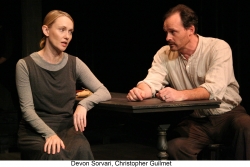I have wanted to see a good production of “The Crucible” for some time, and have tried on several occasions to accomplish this goal only to fail miserably. In fact, I walked out at intermission from two such productions, which I rarely do.
I can count the number of times that I have left a play early on one hand. This play has become my white whale and when the lights go down for Act 1, I tend to brace myself as if for an accident.
I say all of this so that you can truly appreciate the following sentence. I love the Antaeus Company’s production; it is everything I’ve always wanted from this play.
Set in 1692, “The Crucible” examines the confluence of mass hysteria and the fervor of religious extremism during the Salem Witch Trials in Massachusetts.
When several of the local girls fall ill after being discovered dancing in the woods by Reverend Parris, Abigail Williams shifts the blame by falsely claiming that they have all been bewitched.
This accusation snowballs into an all-out witch-hunt resulting in more than 200 accusations and 20 “witches” and their accomplices being put to death. Written in the 1950s, Arthur Miller wrote this play as a poignant commentary on the McCarthyism that was gripping America.
Co-Directors Armin Shimerman and Geoffrey Wade create a thought-provoking commentary of their own in the presentational style of their blocking. From the very first scene the actor’s deliver their lines directly to the audience.
There is a quarter turn into another actor thrown in sporadically, but even then all lines are directed to the audience. This is not a new convention and the impact of it may have dwindled as the play went on, but the genius of Shimerman and Wade’s staging lies in the places where the convention is broken.
The first time occurs when Abigail and the girls conspire together to get their stories straight. The next is in the home of Elizabeth and John Proctor, however, when Reverend Hale crosses their threshold the convention returns.
Whenever the church or the court is present, whenever blind hysteria takes precedence over reason the characters cannot look at each other.
They speak and answer only to the audience creating a chilling introspective into the behaviors and justifications of a people who are caught up and propelled by something that they have deemed greater than themselves.
Thanks to Stephen Gifford’s set design, the paying customers in the seats out front are not the only audience present. The set is very simplistic; drab, unadorned wood, a table that is also used as a sick bed and a couple of stools.
However, in the back behind the playing space are rows of benches – or pews – that are at times full and other time practically empty. This audience is never acknowledged, but they are always there as an unsettling reminder that nothing is sacred or below the reproach and recrimination of the church.
There are also proverbs on the walls above the playing space that are subtly lit by lighting designer Bosco Flanagan, and an illuminated cross on the floor before the show and at intermission. The church’s presence is insidious even in the design.
The cast assembled for this production is fantastic – it should be noted that the Antaeus Company practices “partner casting” in which every role is double cast, and this review is based upon the Proctor Cast.
They worked together superbly as an ensemble creating a natural progression and build into the hysteria and naming of the witches, while still affording several humorous moments to strategically ease the tension so that the audience could stay fully engaged.
There were also several standout performances: Kate Maher as Abigail, Joe Delafield as Reverend Parris, John Prosky as Reverend Hale and Steve Hofvendahl as Corey Giles. However, it was the Proctors, Devon Sorvari as Elizabeth and Christopher Guilmet as John that were truly fantastic.
There was a subtly and nuance that marked their relationship throughout the play that was able to grow so beautifully into the fiercely honest and heartfelt exchanges at the end. It was heartbreaking to behold.
“The Crucible” examines weighty themes and can easily get caught in the hysteria instead of the humanity of the subject matter. The Antaeus Company avoids this pitfall and presents a stellar evening of theatre. Thank-you, I can now cross this show off my theatrical bucket-list.
“The Crucible”
The Antaeus Company
Through July 7
Tickets: www.antaeus.org or 818-506-1983
Kat Michels is a two time regional Emmy award-winning writer with an AAS in video production and a BFA in theatre. www.katmichels.com

